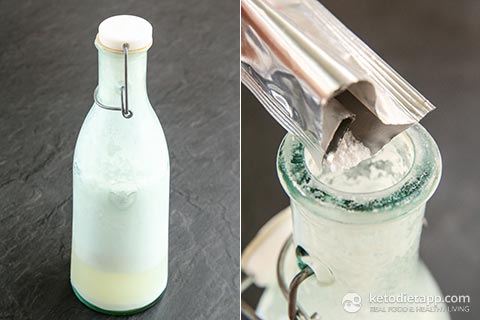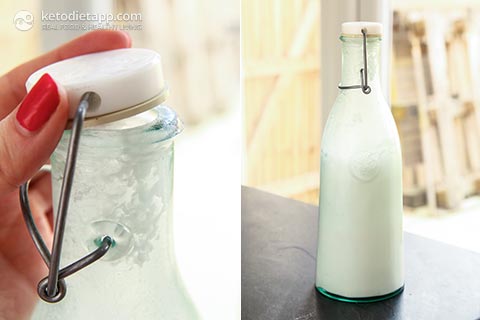Follow us 148.4k
Fermented foods are not only beneficial for our health but are also great for a keto diet. If you follow a paleo friendly ketogenic diet plan and avoid all dairy, you can still enjoy the health benefits of probiotics and enzymes by making kefir from coconut milk.
Coconut milk kefir is a probiotic-rich non-dairy drink made by fermenting coconut milk and kefir starter cultures. Apart from coconut milk kefir, other sources of probiotics are sauerkraut, kimchi or raw full-fat yogurt if you follow a primal approach.
How about carbs in kefir and other fermented foods? Fermented foods are naturally low in carbs. This is a side effect of the fermentation process where bacteria feed on carbohydrates. As a result, the further the fermentation, the less carbs it will contain.
Tips & Substitutions
Nutrition facts are estimated - the amount of carbs depends on the level of fermentation.
Instead of kefir starter cultures, you can use 2 tablespoons of kefir grains or 2 capsules of your favourite probiotics. Make sure you follow the manufacturer's instructions, e.g. some kefir grains need to be rehydrated before you use them for making kefir.
If you use canned coconut milk, use the whole can, not just the "creamed" part on top.
Hands-on Overall
Serving size 1/2 cup/ 120 ml
Nutritional values (per 1/2 cup/ 120 ml)
Net carbs1.9 grams
Protein2.3 grams
Fat24.1 grams
Calories223 kcal
Calories from carbs 3%, protein 4%, fat 93%
Total carbs1.9 gramsFiber0 gramsSugars0 gramsSaturated fat21.4 gramsSodium15 mg(1% RDA)Magnesium52 mg(13% RDA)Potassium122 mg(6% EMR)
Ingredients (makes 4 cups)
Instructions
- If the cream in your coconut milk has separated from the water, shake well or stir with a non-metal spoon. Add the kefir starter and shake or mix until combined. I like this kefir starter because it's easy to use.

- Cover it loosely and leave at room temperature for 24-48 hours in the kitchen or place in the oven (only with the light switched on - do not turn the oven on). The best temperature for making kefir is 22 C - 30 C (72 F - 86 F).
- Taste the kefir in 24 hours and leave to culture for up to 48 hours if needed. When done, shake before use and store in the fridge for up to 2 days. You can make a new batch by using about 3 tablespoons of the cultured mixture and mixing it with more coconut milk.
- Optionally, add your favourite low-carb sweetener, unsweetened vanilla extract, cinnamon or berries and make a smoothie. Store in the fridge for up to 5 days.

Homemade Coconut Milk Kefir
Step by Step
Ingredients
Instructions
- If the cream in your coconut milk has separated from the water, shake well or stir with a non-metal spoon. Add the kefir starter and shake or mix until combined. I like this kefir starter because it's easy to use.
- Cover it loosely and leave at room temperature for 24-48 hours in the kitchen or place in the oven (only with the light switched on - do not turn the oven on). The best temperature for making kefir is 22 C - 30 C (72 F - 86 F).
- Taste the kefir in 24 hours and leave to culture for up to 48 hours if needed. When done, shake before use and store in the fridge for up to 2 days. You can make a new batch by using about 3 tablespoons of the cultured mixture and mixing it with more coconut milk.
- Optionally, add your favourite low-carb sweetener, unsweetened vanilla extract, cinnamon or berries and make a smoothie. Store in the fridge for up to 5 days.
Nutrition (per serving, 1/2 cup/ 120 ml)
Calories223kcal
Net Carbs1.9g
Carbohydrates1.9g
Protein2.3g
Fat24.1g
Saturated Fat21.4g
Fiber0g
Sugar0g
Sodium15mg
Magnesium52mg
Potassium122mg
Detailed nutritional breakdown (per 1/2 cup/ 120 ml)
| Total per 1/2 cup/ 120 ml |
| 1.9 g | 2.3 g | 24.1 g | 223 kcal |
| Coconut milk - used for kefir |
| 1.9 g | 2.3 g | 24.1 g | 223 kcal |
| Probiotic starter cultures |
| 0 g | 0 g | 0 g | 0 kcal |
Do you like this recipe? Share it with your friends!